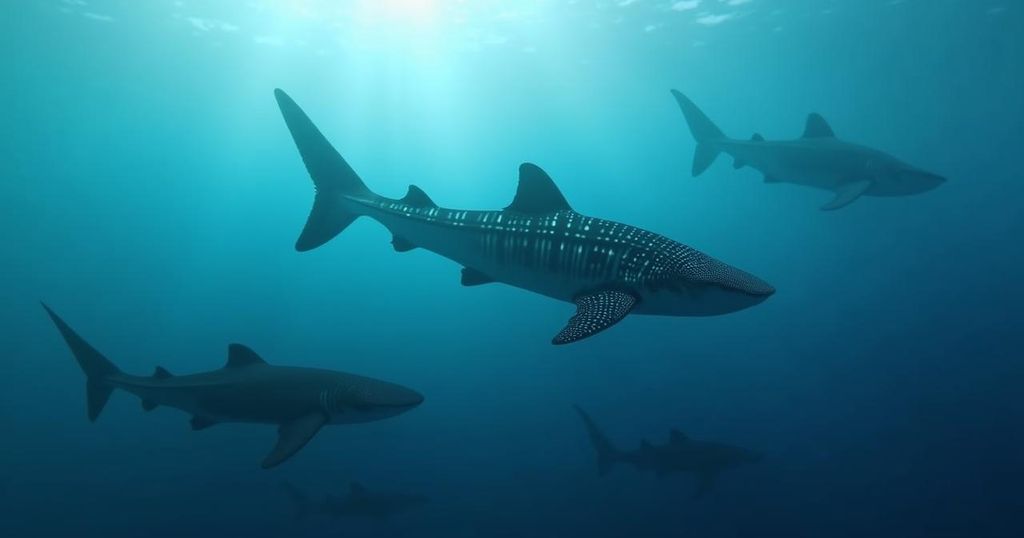Climate Change Increases Collision Risks for Endangered Whale Sharks

Recent research indicates that climate change is significantly increasing the risk of fatal ship strikes for endangered whale sharks as they migrate to new habitats intersected by busy shipping lanes. Predicted projections estimate a dramatic rise in encounters with vessels, particularly in regions like the North Pacific and Eastern China Seas, due to rising ocean temperatures driven by greenhouse gas emissions. Effective management and mitigation strategies are essential to address these pressing challenges.
Recent research has indicated that whale sharks, the largest species of fish, face an increased risk of fatal collisions with shipping vessels as a direct consequence of climate change. These endangered creatures, which can exceed lengths of 60 feet, are being driven into new habitats that intersect with busy shipping routes due to rising ocean temperatures. A study conducted by scholars at the University of Southampton and the Marine Biological Association, published in the journal Nature Climate Change, forecasts a staggering rise in the likelihood of whale sharks encountering large ships, with projections indicating a potential increase of up to 15,000 times by the century’s end. Dr. Freya Womersley, the lead author, emphasized that shifts in whale shark habitats will be particularly pronounced under scenarios of high greenhouse gas emissions. She stated, “A global reshuffling could lead to core habitat losses in some areas as well as increased co-occurrence with shipping traffic as oceans warm and other variables change.” While whale sharks are known for their extensive mobility and adaptability to temperature changes, they are concurrently more susceptible to ship strikes, a peril where these majestic creatures are harmed, often fatally, by large marine vessels. Employing satellite tracking data and global climate models, researchers evaluated whale shark distributions under three distinct future climate scenarios. The findings suggest that by the year 2100, certain national waters may experience over a 50% loss of core whale shark habitat under current emission trends, particularly in Asia. Conversely, in scenarios aligned with sustainable development, designed to limit temperature rise to below 2°C, some regions, notably in Europe, may witness gains in suitable habitats. Professor David Sims, a co-author of the study, reiterated the importance of immediate action against climate change, noting, “The shifts we predict are likely to be less extreme if we are able to slow warming and mitigate climate change.” The study correlated distribution maps with shipping traffic data, revealing that potential shifts in whale shark habitats could lead them into busier maritime areas. Regions such as the US part of the North Pacific Ocean and the Japanese segment of the Eastern China Seas were identified as locales where newly favorable habitats overlap with high shipping traffic. However, some areas, like the Gulf of Mexico, showed a decrease in overlap as whale shark habitats shifted closer to the coast, away from shipping lanes. Sims stated, “Overall ship co-occurrence increased under all future climate scenarios, even if shipping remained at current levels, rather than its anticipated expansion of up to 1,200% by 2050.” Dr. Womersley concluded by underlining the critical need to integrate climate change considerations into strategies for managing endangered species effectively, reiterating the multifaceted impacts of human activity and environmental change on vulnerable marine life.
The phenomenon of climate change has far-reaching impacts on marine ecosystems, particularly for sensitive species such as the whale shark (Rhincodon typus). These creatures are listed as endangered by the International Union for Conservation of Nature (IUCN), and their population is threatened by various anthropogenic pressures, including habitat degradation, fishing, and vessel traffic. As ocean temperatures rise, many marine species are being forced to migrate to new habitats in search of suitable conditions. This shifting of habitats not only affects species’ survival but also increases their interactions with human activities, particularly in busy shipping zones. The study discussed emphasizes the urgent need for research and management strategies that consider these changing dynamics amidst the ongoing climate crisis.
In conclusion, the alarming findings from the study conducted by the University of Southampton and the Marine Biological Association illustrate the intricate relationship between climate change and its indirect effects on endangered marine species such as whale sharks. As warming oceans drive these creatures into increasingly busy shipping lanes, the likelihood of fatal collisions rises drastically. Urgent action and sustainable practices are imperative to mitigate these risks and protect vulnerable marine populations. The insights presented call for integrated conservation efforts that encompass discussions around climate change impacts, highlighting the need for immediate and coordinated action to safeguard the future of these majestic fish.
Original Source: www.thetimes-tribune.com






